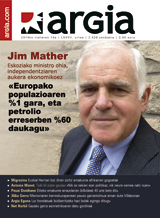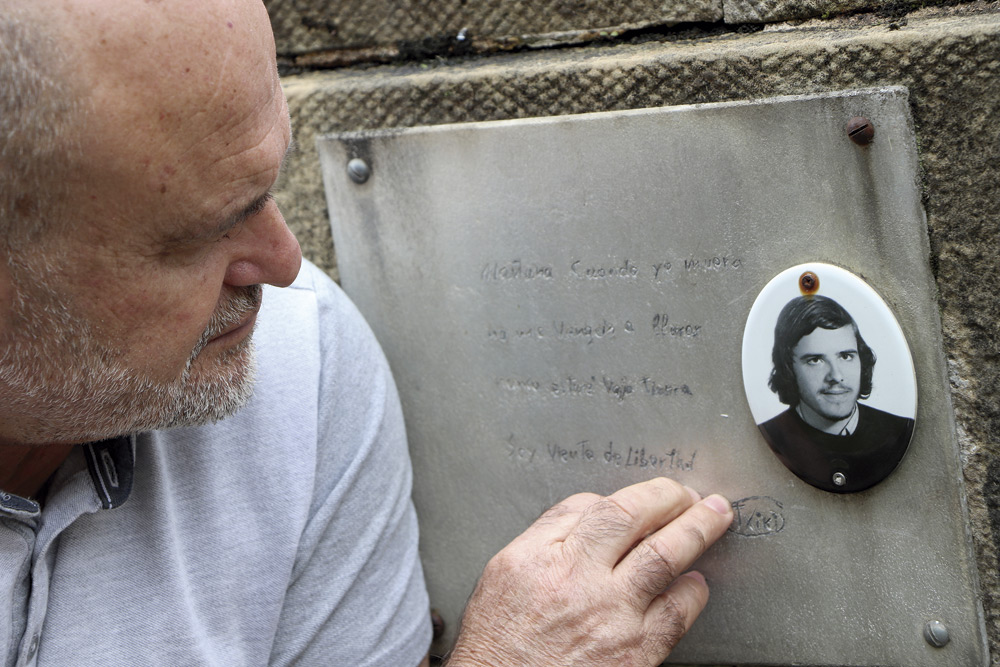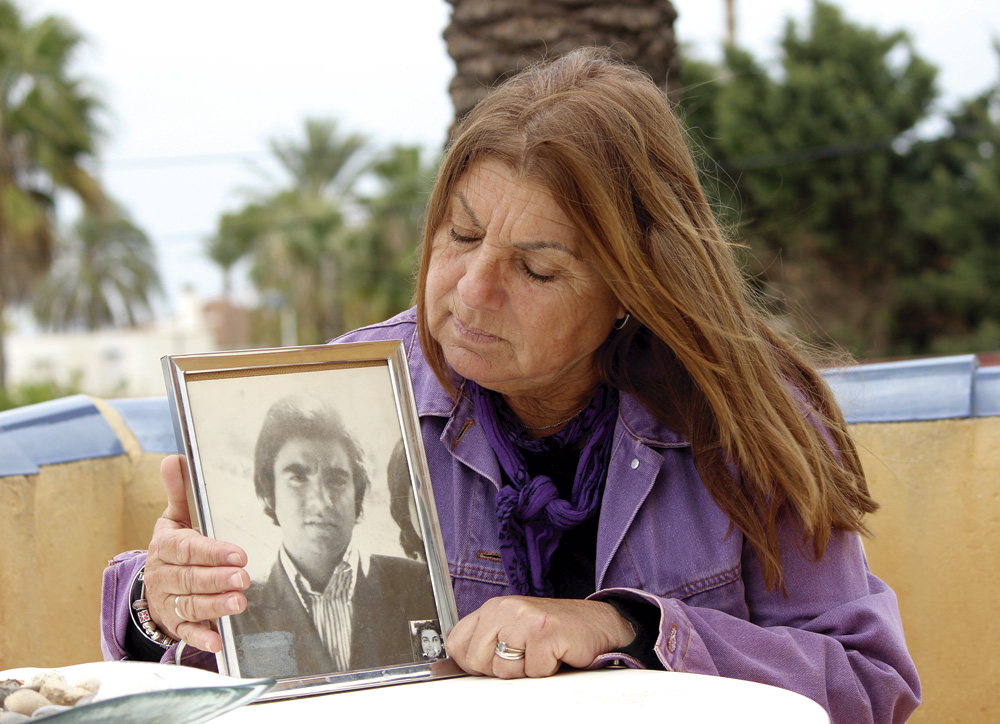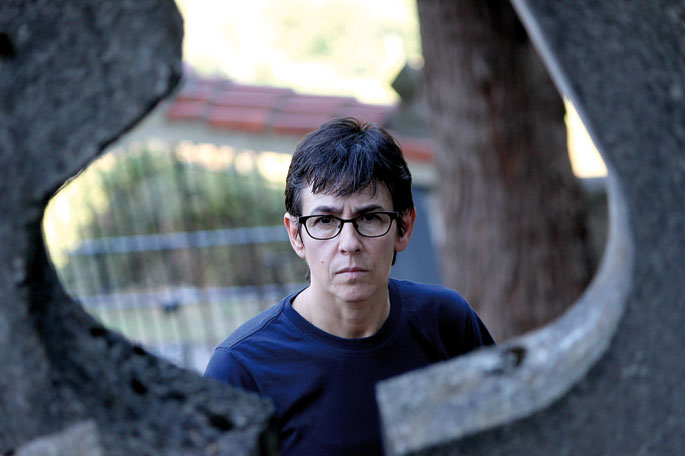"Even before my son's happened, people helped me a lot here."
- 27 September 1975. Franco at the end, appointed substitute for Juan Carlos I de Borbón. Five shot: Txiki, Otaegi, Sánchez Bravo, Baena, García Sanz. Antonia Manot is Txiki's mother. From Zalamea de la Serena to Zarautz, passing through Barcelona…

Antonia Maria Manot…
In the village where we were Manotas, I have always been Antonia Maria Manotas Garcia, and my relatives have always been Manotas Garcia. In that, at the time when my Jon died, they started in Barcelona and the names of Manotas were not appearing anywhere. They put John to Manot. I, for my part, said that we were Manots, how were they going to put Manot! My eldest son, Mikel, went to the record, looking for Manots, but no, who was nothing more than Manot, who had to be created by the people of the town.
His son Kepa told me he was 85 years old.
I am from 1929, from June 14, born in Zalamea de la Serena [Badajoz, Extremadura]. The most beautiful of all nations! In the area are Esparragosa, El Puerto, Higuera, Monterrubio… Very small towns, not only doctors, are almost neighbors. On the contrary, Zalamea de la Serena is a town.

You were a few peasants in your house.
Hardened farmers. The parents had land, they sowed wheat, oats and so on. They had mules for the tillage. It was their trade. Once a year the pig would kill you and from there they would come chorizo, lomo, morcilla...
At home peasants, but you didn’t go to the camp much…
If I was the governer! We were five brothers, two boys and three girls, I the oldest, and Miss! Every day, they went with their father to the Naughty countryside, with mules. This lady was going to sew. My parents decided that I had no part in it. Certainly, Antonia Maria was what they wanted. The oldest of these houses. Among us, me!
From Zalamea de la Serena you came to Zarautz.
First, my sister, Anita, who is now at Zalama. He was the first to arrive, accompanied by his husband. He started working here in a factory. Behind him came my brother Fernando and my parents. I stayed there, married to a pastor. Among sheep, just be a lady! I was 21 when I got married, when I was waiting. Then came the children one after another, seven; in addition, one abortion and one that died, nine in total. I had five children when we arrived and I was already here the oldest, Miguel, with my parents. They were downloading me.
In the 1960s, you were here, in 1962.
Yes, my Mikel did it here and communion with my parents. You know a lot about me, eh!
I've read something here and there. The last one was the interview made by Bernardo Atxaga in Erlea magazine.
I'm glad you remember me!

You've always said that people have remembered you, how many people have visited you after killing Jon.
Yes. You don't know how much it costs for a mother who has lost her child! Influx of public at home. All right. I lost my son, as he said to me, but I gained a lot in the Basque Country! After Jone's, I wandered down the street and, in front of me, three or four excellent young people, who I didn't know at all: "Goodbye, Mom! Goodbye!” Zalamea's coming was a heaven for me, even before my son's, because people helped me so much. I fell as if I had come down from the sky in Zarautz, everyone was helping me.
Before Zarautz you had never seen the sea!
Let's not talk! It's he who has to get us out of the marmite! It was nothing more than a bad puddle that led us to wash our clothes with a basket on our heads. It was a sort of manger, a distance from Zarautz to Getaria, to wash the clothes and touch the bleach. Once cleaned, remove the basket over the head and towards Zalamea. That was not life! That was killing yourself at work! Life is here.
Here, too, there was work. For thirty-two years he worked in the college of the Franciscans, serving in the kitchen.
I had to form my family! I got there and soon I started working with them. Very young friars, handcuffs and handcuffs… What a handcuff! If they hadn't asked me, I would have seen it! Ha, ha, ha. He worked in the twelve to four monks. Only I served food for eighty children. Well, sometimes there came Fr. Bartolo. “You’re sweating. I'll help you." Two months after I started working, Father Biain called me. “Antonia Maria, the leadership has come together and we have decided that the children will get to work and bring us home the necessary money.” For six years, I brought bread home, until Mikel and Jon started working. I said to the Franciscans: “Quite a lot, the kids are working, I won’t have to bring more bread. Thank you!” The friars helped him, of course.
Mikel and Jon, the two biggest.
Michael grew up here first with his grandparents. His uncles were also here. Here he made the communion, he began to study in the monks. The rest also studied at the Franciscan College, where they joined their jobs after completing their studies.
And then what happened? Did you feel anything?
At first, nothing. For the rest, nothing before Jone happened. In fact, we were from Extremadura, the Basque language was here, but we didn't think it was ours. What it is like to be selfish! We didn't think it was ours. Well, I remember Jon was working at the Zarauz Plastics factory. At noon I would come to lunch and say: “Mom, why don’t you learn Basque?” “because it costs me a lot, my son.” My Jon said a few words to me in Euskera, but I was forgotten in the air. First it was John, but he wanted Jon. “Mother, John isn’t longer! Jon is a little smaller!” Your accounts. Maybe with his friends he goes to the mountain and, back, he has four or five sacks in Jon's bedroom. “And these sleeping bags?” “friends would leave them, Mom.” Like that.

When did you know Jon was missing?
August. Maybe in July. And they killed him in September! He worked until the last hour, first at Zarautz, then at the Xey factory in Zumaia. When they killed him, they sent me the envelope from the Zumaia factory. A lot of money! I was scared to see it! “It can’t be, the issue is smaller, it’s safe.” “Take it, I was a good kid,” they told me. Among the workers in Zumaia, who worked in Zumaia, they collected the money.
She saw her two or three times, even after leaving the house...
Well, Jon left home and I saw him in Donostia, in Iparralde, and in a small town in the area of Zumarraga. I remember Zumarraga, because I threaded him. “Look, my friends are not going to be angry today,” he told me. The Donostia/San Sebastian was very exciting. I knew there was salsa, but not that thick. Mikel told me that Jon wanted to see the younger siblings. That is what it was! “Well, come on,” I said. And we took Mikel's car and went to see Kepa and Perdi. Their names are translated into Euskera in the court; before they were Pedro and Fernando. Fernando, in Basque, was given Perdinanda, but it's very long, and we call him Perdi. We went to the old part, where we were sitting in the car, waiting for Jon to show up. One day, a low-rise boy, well-dressed, a kind of purse under his arm, some glasses -- he looked like a professor. I didn't recognize him! He had been in disguise. It wasn't Jon that I knew. And the kisses there! I didn't know anything about politics, I wanted my son!

You also saw it in Barcelona…
I went, but they didn't let me see. I spent the day in jail waiting to see her, until it was done at night and closed. Well, they didn't leave me. “Let’s see if you have heart, I want to greet!” They didn't allow me to give the last goodbye. They had it like a dog... the last one I saw at the trial. On the one hand, a multitude of civil guards surrounding Jon, and on the other hand, we sat down. “Can’t I kiss my son? Can’t I kiss her?” They talked, apparently, and they were kissing. I went and kissed her. I told him everything was surrounded by civil guards. “Do you know what you have to do?” “Yes, Mom, I know, since they caught me!” I saw something, and I put my shirt down a little bit. Everything was livid: “Oh, my son, what have you done? How do you have your body?” “Yes, mother, like that! The hood would come next to me and say: ‘Basque Extremeño, you’re tough. No one will fall for you!” And the last words of Jon that he had told me: “Don’t worry, Mom, you’re going to lose a child, but you’re going to win a lot in the Basque Country.” And that's it.
The military did not allow him to give his son his last goodbye. Your son Mikel greeted her at the time of death, when he was shot.
We didn't want to leave it alone. He says that Mikel will never forget that look of Jon. It cannot be forgotten. I would not have been aware, I would not have been able… Since then, yes, we have already been in Barcelona and where they have killed it. We were there with the lawyers [Marc Palmes and Magda Oranich] and, the last one, when we went to Catalonia, we went to the place where he was killed, we put the ikurrina, the flowers… They also have a plate in the place where my Jon was killed. However, they are placed at the time of the event and when there is nothing they collect it, if they do not take it.
This year your son and four other people have been shot. What is happening now on 27 September?
It's many years and you get to accept them. But you always remember it. However, he died because of what he believed. On 27 September Txiki was murdered, Otaegi was murdered and three other people were murdered in Madrid. You don't hear his name. The sister of one of them speaks [Flor Baena]. Another has no family [Ramón García Sanz]. The third, [José Luis Sánchez Bravo], doesn't seem to have a lot of family. Besides, you know, in Madrid, and there is nothing to do there...

“Etxepekoa genuen emakumea, baina etxez aldatua dago orain. Oso lagun onak ginen. Eta ezer behar nuenean, hantxe beti Mikele. Gizona eta bi ume zituen, baina Mikele beti niri laguntzen, honetan eta hartan eta behar zenetan. Ahizpa baino gehiago izan dut. Bartzelonara joan behar izan nuenean, Bartzelonara etorri zen nirekin! Militarrak ikustera joan ginen, erruki eske, Jon salbatzeko eskatzera. Kapitain batek hartu gintuen, behintzat: ‘Ez dago egin litekeenik. Miraria gertatzen ez bada, akabo!’, esan zigun”.
Antonia Maria Manot Garcia (Zalamea de la Serena, Extremadura, Espainia, 1929). Frankismoaren hondarrean, 1975eko irailaren 27an, fusilatu zituzten bost borrokalarietako baten ama da, Jon Paredes Manot “Txiki”rena. Semea bidegabe hil zioten amaren lekukotasuna da Manot, eta, horrekin batera, etorkinaren historia bizia.
“Jon hil eta gero, iluntze batean, gizon batzuk sartu ziren hona, etxera. Hemen, nire umeak, fraide bat eta ni geunden. Galdezka eta joka eraso ziguten. Nik, burua odoletan, eskaileran behetik gora Mikeleri hoska, ‘Mikele, Mikele, umeak akabatu nahi dizkidate’. Eta hantxe Mikele goitik behera, auzoei hoska: ‘Irten denok etxetik, Antonia akabatu nahi dute!’. Gizon haiek zalaparta aditu zutenean, nire etxetik irten, autoan sartu –ingurua dena ilunpetan zegoen–, eta hanka egin zuten. Gu odoletan, umeak negarrez... Orduan ere, hantxe Mikele. Beti ondoan izan dut emakume hori”.
Antonia Manotek inoiz esanak, Jokin Urainek Agurra eta Ohorea liburura aldatuak: “Hileta eguna izugarria izan zen. Etxeko txikiek koroa bana zeramatela abiatu ginen. Etxetik irten eta elizara gindoazen trenaren pasabidetik. Lehenago, berrogei edo berrogeita hamar polizia etorri eta gerarazi gintuzten. Jendea negarrez, koroa haiek, isiltasun hura… zapata takoien hotsa besterik ez zen aditzen. Entzuten ari naiz oraindik”.
“Hil zutenean, militarrek ez ziguten gorpua Zarautza ekartzen utzi. Han, hiru familiei hilobi bana eskaini ziguten. Pons Rovira familiaren panteoian egon zen, haiek ere semea zuten preso. Handik hamabost hilabetera ekarri genuen Jonen gorpua Zarautza. Harrezkero bakean da. Horretan ikaragarri lagundu zigun orduko alkateak, Imanol Muruak. Hari eskerrak!”.
Irailak 27, krimenaren +42. urtea. Gezurra dirudi Bartzelona urrunean abokatu zahar bati eztarria korapilatzea, euskaldunok espektakulutan entreteniturik gabiltzan bitartean.
Tramitera ere ez dute onartu auzitegiek eskaera. Azpeitiko Udalak eta familiak frankismoaren krimenen kontrako Argentinako kereilara batuko dute kasua.
Haren hilketaren erantzuleak zeintzuk diren argitzea eta horiei ardurak eta erantzunkizunak eskatzea nahi dute. Horretarako, sumarioaren kopia bat eskuratzea nahi dute. Bidea "zaila" izango dela azaldu du Angel Otaegiren familiako abokatuak, baina "merezi"... [+]


















